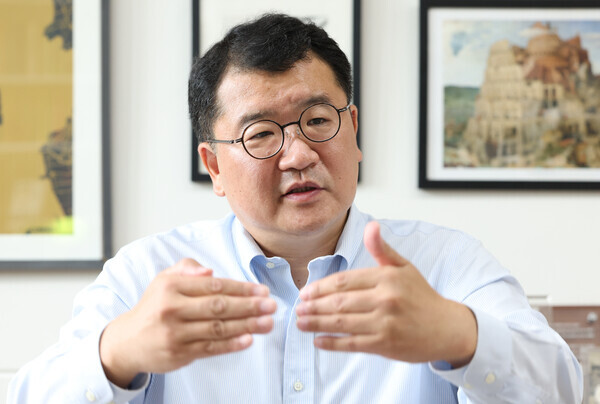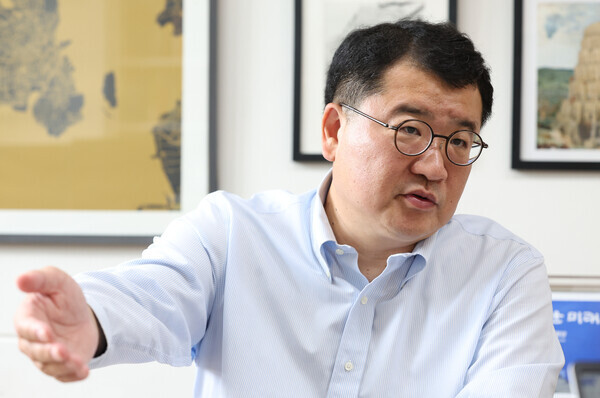hankyoreh
Links to other country sites 다른 나라 사이트 링크
[Interview] US should have accepted NK’s offer to shutter Yongbyon, says former SK vice foreign minister

“To be honest, I didn’t really want to write it,” Choi Jong-kun said of his newly released book, “The Power of Peace.” “But as I watched the people I worked with suffer hardships with the launch of the current administration and the past five years [of the Moon Jae-in administration] get denigrated, I considered what I could do. That’s why I started writing.”
On why he wrote “The Power of Peace” (Medici Media), a book that reconstructs the foreign and security policies carried out during the five years of the Moon administration, the professor of political science and international studies at Yonsei University who served as Blue House secretary for peace planning as well as vice foreign minister during Moon’s presidency, said, “Because I couldn’t stand and do nothing in the current situation.”
“People like Director Suh Hoon [of the National Intelligence Service] and Director Chung Eui-yong [National Security Office] were cut down to pieces by the blade of jurisdiction,” Choi went on. “Prosecutors indicted and brought to trial people who worked hard for peace on the Korean Peninsula. The Yoon Suk-yeol administration showered indiscriminate criticism on efforts we made for peace, calling them initiatives for ‘false peace.’”
In an interview with the Hankyoreh on Friday, Choi explained that, faced with such a predicament, he “decided to write a book after thinking that the memories and experiences [he] possessed should not remain [his] private property.”
Welcoming the publication of Choi’s book on Monday, Moon wrote on Facebook that it includes “content [he] would like to include if [he] wrote a memoir one day regarding the Moon administration’s views on peace, its unrelenting efforts for peace, its accomplishments and limitations, and its reflections.”
“The Power of Peace” is largely divided into four sections. The first section details how the situation on the Korean Peninsula, which hurtled dangerously close to war in 2017 as the leaders of North Korea and the US traded barbs with each other, transitioned dramatically to a phase of dialogue in 2018. The second section consists of behind-the-scenes stories surrounding the signing of the Sept. 19 inter-Korean military agreement, which Choi personally oversaw. The third section reconstructs the reason the North Korea-US summit in Hanoi failed on Feb. 28, 2019, from the South Korean government’s perspective, while the fourth section, titled “Presidents and Peace,” compares Yoon’s rhetoric with Moon’s.
Just as one would expect from an account written by the very person who executed the “Korean Peninsula peace process,” which was pursued all throughout the Moon administration’s five-year term, the book includes a number of little-known and never-before-revealed anecdotes, making it an entertaining read.
In a passage that sticks out the most from the book, Choi describes what happened on Sept. 23, 2017, when the confrontation between North Korea and the US reached a fever pitch. That day, two B-1B supersonic bombers, also known in Korea as the “swan of death,” and a formation of F-15 fighter jets belonging to the US military flew 100 kilometers north of the latitude marking the Northern Limit Line (NLL). Though the flights technically took place in international airspace over the East Sea, they occurred within 200 kilometers of the nuclear test site in the village of Punggye.
“We knew US bombers were heading north, but we received the report that they went beyond the NLL half a day later,” Choi recalled. “The US doesn’t notify us separately. I remember how former President Roh Moo-hyun had said that ‘a war can break out on the Korean Peninsula without our knowledge.’”
While North Korea and the US bombarded each other with negative statements, Moon alone called for peace, remarking during his Liberation Day address, “Without the consent of the Republic of Korea, no country can determine to take military action. The Government will do all it can to prevent a war from breaking out.” A mere seven months later, the leaders of South and North Korea faced each other at Panmunjom on April 27, 2018, as if nothing had happened. The two leaders held what was practically a private one-on-one meeting for roughly 30 minutes at a table prepared on the left side of a sign marking the Military Demarcation Line on the pedestrian bridge at Panmunjom.
“Chairman Kim Jong-un spoke to Moon about his various strategic concerns,” Choi recounted. “He reportedly asked what kind of relationship [North Korea] should establish with the US, and how a trusting relationship could be built with President Trump. Kim also reportedly said he would continuously cooperate and communicate with Moon moving forward.”

Choi estimated that the situation on the Korean Peninsula would be remarkably different today if the US accepted the offer of dismantling the Yongbyon nuclear facility North Korea made during the Hanoi summit.
“It was frustrating,” he commented. “Yongbyon is an area twice the size of Yeouido. There are 298 buildings there, including dormitories. It’s not like the US can go in there with pickaxes and tear everything down to denuclearize Yongbyon. The demolition has to be carried out together with North Korean nuclear technicians who built the facility themselves, using North Korean blueprints. That place is the ‘nervous tissue’ of North Korea’s nuclear facilities, and the people who would have demolished it with the US would have been the very people who built a second and third secret nuclear facility other than Yongbyon. Tearing down the facility over 20 or so years would have made us privy to all of North Korea’s nuclear plans. On the flip side, if you think about why the North might have offered Yongbyon first, they probably believed relinquishing Yongbyon would most clearly demonstrate their will to denuclearize.”
The last thing Choi emphasized was the importance of the words the president puts out into the world. His book offers several depictions of Moon polishing and belaboring over the words he would voice in public.
“Compare the speech Moon gave in front of 150,000 North Korean citizens at Rungrado May Day Stadium in Pyongyang on Sept. 19, 2018, with the speech Yoon gave at Jangchung Gymnasium to mark the 69th anniversary of the Korea Freedom Federation,” Choi suggested. “The contrast is staggering. Whose speech will history remember for a longer period of time? The former offers an extremely inclusive, constitutional message that argues for a will for peace, denuclearization, and opposition against war as well as a community spirit on the Korean Peninsula. The speech given at Jangchung Gymnasium was one of the Cold War without a basic plan as to [how to move inter-Korean relations forward].”
In his address, Yoon defined the Moon administration, which pursued the Korean Peninsula peace process and an official end to the Korean War, an “anti-state force.”
“For the time being, there will be nothing to do in regard to inter-Korean relations,” Choi lamented. “Dubbed an anti-state force, we advocates for peace need to strengthen internal unity while overcoming government criticism by coming up with different measures for denuclearization and peace.”
The former vice minister suggested that peace advocates need to “broaden our base to include the younger generation. At the launch party for [former unification minister] Lim Dong-won’s autobiography, ‘Peace, Again,’ which I attended [last October], I was the youngest person in attendance.”
By Gil Yun-hyung, staff reporter
Please direct questions or comments to [english@hani.co.kr]

Editorial・opinion
![[Editorial] Intensifying US-China rivalry means Seoul must address uncertainty with Beijing sooner than later [Editorial] Intensifying US-China rivalry means Seoul must address uncertainty with Beijing sooner than later](https://flexible.img.hani.co.kr/flexible/normal/500/300/imgdb/original/2024/0517/8117159322045222.jpg) [Editorial] Intensifying US-China rivalry means Seoul must address uncertainty with Beijing sooner than later
[Editorial] Intensifying US-China rivalry means Seoul must address uncertainty with Beijing sooner than later![[Column] When ‘fairness’ means hate and violence [Column] When ‘fairness’ means hate and violence](https://flexible.img.hani.co.kr/flexible/normal/500/300/imgdb/original/2024/0516/7417158465908824.jpg) [Column] When ‘fairness’ means hate and violence
[Column] When ‘fairness’ means hate and violence- [Editorial] Yoon must stop abusing authority to shield himself from investigation
- [Column] US troop withdrawal from Korea could be the Acheson Line all over
- [Column] How to win back readers who’ve turned to YouTube for news
- [Column] Welcome to the president’s pity party
- [Editorial] Korea must respond firmly to Japan’s attempt to usurp Line
- [Editorial] Transfers of prosecutors investigating Korea’s first lady send chilling message
- [Column] Will Seoul’s ties with Moscow really recover on their own?
- [Column] Samsung’s ‘lost decade’ and Lee Jae-yong’s mismatched chopsticks
Most viewed articles
- 1For new generation of Chinese artists, discontent is disobedience
- 2[Editorial] Transfers of prosecutors investigating Korea’s first lady send chilling message
- 3S. Korea “monitoring developments” after report of secret Chinese police station in Seoul
- 4Xi, Putin ‘oppose acts of military intimidation’ against N. Korea by US in joint statement
- 5[Exclusive] Unearthed memo suggests Gwangju Uprising missing may have been cremated
- 6N. Korean media upgrades epithet for leader’s daughter from “beloved” to “respected”
- 7Yoon says concern about biased diplomacy is being incited by “communist totalitarian forces”
- 8[Column] US troop withdrawal from Korea could be the Acheson Line all over
- 9[Editorial] Intensifying US-China rivalry means Seoul must address uncertainty with Beijing sooner t
- 10[Interview] Recalling seeing soldiers secretly burying bodies behind Gwangju Prison